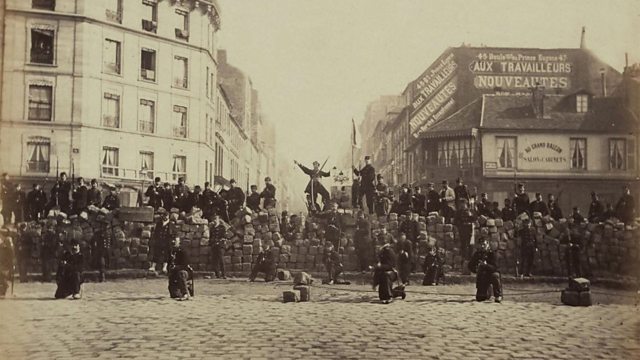Education
Dan Rebellato revisits the Paris Commune, a cornerstone of radical culture, politics and social movements, and its legacy today, on its 150th anniversary.
The Paris Commune lasted less than 100 days, yet this populist movement had extraordinary impact and offers a fascinating comparison to populist turbulence in 2021. Having survived the horrors of the Siege of Paris, winter of 1870-71, Parisians refused to accept the terms of French surrender after the Franco-Prussian war and declared independence. For ten weeks, the Communards experimented with alternative living: revolutionising education, political representation, the role of women, the upbringing of children, even parts of the landscape. The Commune was crushed brutally at the end of May, but it caught the attention of conservatives and radicals across the world. 150 years later, what does the Commune still have to say to us? Have we lost its legacy or, just maybe, are we all Communards now?
Dan Rebellato, writer and thinker, is inspired by personal observation of the modern legacy of the commune:
“In 2016, my wife and I moved to Paris and we had a baby. In London, walking along a narrow pavement with a buggy, people generally get out of your way. In Paris, there’s often a stand-off. In London, the public space is not really public at all; we carry with us a portable sphere of private space that should not be invaded. In Paris, if you’re on the street, you’re in the debate. Although French society is in many ways very deferential and hierarchical, this is not true on the streets. Anyone can speak to anyone - in Paris, every encounter is a debate. And so I found myself looking into the history of those Parisian streets; the way they’ve been remodelled and remade, the way the famous cobblestones have been torn up as weapons, the way the boulevards are ghosted by barricades and street battles. It’s a story that has markers in 1968 and 1961 and 1945 and 1940 but ultimately this contested Paris, where the very streets are sites of battle and debate, takes us back to 1871 and the Commune.”
These essays will bring the Commune to life with vivid description of key moments, entering into history, to explore how it shaped French society and beyond, through personal connection with the facts and the sense of a city Dan knows well.
Essay 2: Education
8 April 1871: On 8 April 1871, the Commune declared that religion would be taken out of the schools: no religious iconography, no prayers, no hymns. Schools would be a place where the young openly come to learn without the shadow of prior beliefs to constrain their freedom. Although this principle was undone as soon as the Commune was destroyed, it returned only a decade later in the principle of laïcité, of secularism, enshrined in the Ferry Laws of 1882. The ethos of the Commune will be familiar to most children who’ve been educated in Britain since the 1960s: an emphasis on the creative expression more than rote-learning, the equal education of boys and girls and so on. There is a direct line from the Commune’s education policy to the drama club in my 1970s south London primary school.
Dan Rebellato is a leading British radio dramatist, as well as a Professor of Contemporary Theatre at Royal Holloway London. He has written extensively for ����ý Radio 3 and 4, most recently Killer for Radio 3, as well as theatres such as Plymouth Drum, Suspect Culture and Graeae, and Pitlochry Festival Theatre. He has won Sonys and ����ý Audio Awards for his radio dramas. He was lead writer on the blockbuster ����ý Radio 4 Series, Emile Zola; Blood Sex and Money, starring Glenda Jackson. He has published several books, most recently co editing Contemporary European Playwrights in 2020, and is currently writing a practical playwriting guide for the National Theatre, due out in 2021/22.
Director/Producer, Polly Thomas
Executive Producer, Eloise Whitmore
A Naked Production for ����ý Radio 3
Last on
Broadcast
- Tue 4 May 2021 22:45����ý Radio 3
Death in Trieste
Watch: My Deaf World
The Book that Changed Me
Five figures from the arts and science introduce books that changed their lives and work.
Podcast
-
![]()
The Essay
Essays from leading writers on arts, history, philosophy, science, religion and beyond.





